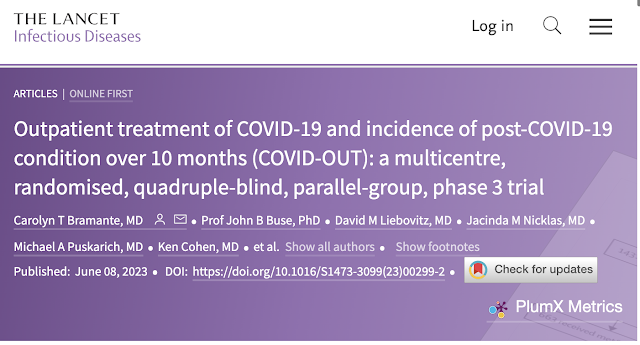Metformin Reduces Long-COVID Risk by 41 Percent: Study (2023)

Deep Dive Into the Study
The University of Minnesota spearheaded a large-scale, placebo-controlled study called COVID-OUT. The study aimed to determine whether administering metformin, ivermectin, or fluvoxamine during the early stages of COVID-19 outpatient treatment could decrease the likelihood of developing long COVID.
This expansive phase 3 trial spanned six sites across the United States. The researchers worked with a substantial participant pool of over 1,100 overweight or obese adults aged 30 and above. None of these individuals had been previously infected with COVID-19, and around half had received a COVID-19 vaccination. All participants experienced COVID-19 symptoms for less than a week and tested positive for the virus within three days before enrolling in the study.
Once diagnosed, participants were randomly divided into different treatment combinations. Some got metformin combined with either ivermectin or fluvoxamine. Some others received metformin paired with a placebo; the rest were given either ivermectin or fluvoxamine alongside a placebo. Lastly, one group was given two placebos.
The study found that 6.3 percent of participants who received metformin developed long COVID within the ten-month follow-up period, compared to 10.4 percent of those who received a placebo.
Essentially, a two-week course of metformin reduced the incidence of long COVID by 41 percent. Interestingly, starting metformin within three days of symptom onset led to an even greater reduction in long COVID risk.
Unveiling the Power of Metformin
Metformin is a common and cost-effective medication traditionally prescribed to manage high blood sugar in people with Type 2 diabetes. For those without insurance, a 500 mg pill of metformin—the same dosage used in the study—can typically be purchased for about 33 cents.
“Not only did we demonstrate that metformin, an inexpensive and safe treatment, may prevent the development of long COVID in many people, but we validated that long COVID is a real disease in that a 14-day treatment can reduce the risk of long COVID symptoms and a doctor’s diagnosis over many months,” said John Buse, MD, Ph.D., co-author and senior associate dean for clinical research at the UNC School of Medicine, in a news release.
The protective impact of metformin held across various demographic groups and multiple viral strains, including the Omicron variant. The results echo previous findings that metformin may reduce the severity of COVID-19 and improve outcomes such as emergency department visits, hospitalizations, and deaths.
Study authors acknowledge that the mechanisms by which metformin helps prevent long COVID are not entirely known, although they pose some theories. Previous studies show that metformin may inhibit the replication of the SARS-CoV-2 virus by blocking the production of viral proteins. The drug also helps reduce harmful inflammation and oxidative stress, factors that make COVID-19 symptoms worse.
Ivermectin Falls Short
In this trial, the researchers also tested the potential impacts of two other drugs, ivermectin and fluvoxamine, on long COVID. Fluvoxamine, an antidepressant commonly used to manage obsessive-compulsive disorder, had shown some potential in earlier studies for reducing COVID severity.
Ivermectin, on the other hand, is a drug usually used against parasites and showed some promise in the early stages of COVID. However, other research has indicated that it may not be as effective for COVID treatment.
For those that received ivermectin, 7.7 percent developed long COVID compared to 8.1 percent who received a matched placebo.
“Neither ivermectin nor fluvoxamine had a significant effect on the incidence of long COVID,” reported the study authors.
This finding is noteworthy given the global attention ivermectin has received as a possible treatment for COVID-19. While some had hoped that ivermectin might offer a dual benefit by both treating acute COVID-19 and preventing long COVID, the findings from this current study suggest otherwise.
The Ever-Evolving Battle Against Long COVID
The persistent challenge of long COVID continues to strain healthcare systems worldwide as we grapple with the lingering aftermath of the COVID-19 pandemic. Long COVID, or Post-Acute Sequelae of SARS-CoV-2 infection (PASC), is an umbrella term for a wide range of symptoms that continue for weeks, months, or even years following the initial recovery from the virus.
In the U.S. alone, according to recent data from the CDC, approximately 15 percent of individuals who contracted COVID-19 report symptoms of long COVID, underscoring the magnitude of this crisis. Moreover, females appear to be impacted at nearly twice the rate of men.
Hundreds of symptoms characterize long COVID, including but not limited to cognitive challenges or ‘brain fog,’ breathlessness, chest discomfort, sleeping disturbances, fevers, gastrointestinal complications, anxiety, and depression. A recently published study revealed that fatigue is one of the most severe symptoms experienced by patients, so much so that it diminishes their quality of life to levels likened to those diagnosed with cancer or stroke.
Long COVID has been observed in severe and mild COVID-19 cases and can affect individuals regardless of age, underlying health conditions, or the severity of their initial infection.
Notably, long COVID also poses significant social and economic impacts. Numerous patients struggle to resume work and everyday activities. The additional demand for ongoing care and support places an intense burden on healthcare systems, underlining the lasting repercussions of the disease.
Limitations and Implications
The research concentrated on individuals over 30 who are overweight, leaving unanswered questions about the effects of metformin on younger or less overweight populations. The participant pool was also largely white, offering a limited representation of other racial and ethnic communities.The research focused on first-time COVID-19 infections. Hence it is unclear whether metformin would be similarly protective against long COVID in individuals who had previously contracted the virus. The study did not imply that metformin is an effective treatment for long COVID but instead emphasized its potential as a preventive measure.





.png)


Comments
Post a Comment